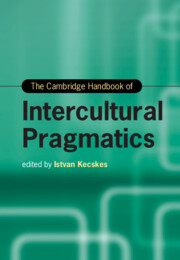Book contents
- The Cambridge Handbook of Intercultural Pragmatics
- Cambridge Handbooks in Language and Linguistics
- The Cambridge Handbook of Intercultural Pragmatics
- Copyright page
- Contents
- Figures
- Tables
- Acknowledgment
- Contributors
- Introduction The Rise of Intercultural Pragmatics
- Part I Theoretical Foundation
- Part II Key Issues in Intercultural Pragmatics Research
- Part III Interface of Intercultural Pragmatics and Related Disciplines
- Part IV Intercultural Pragmatics in Different Types of Communication
- Part V Language Learning
- 28 Pragmatic Competence
- 29 Pragmatic Awareness in Intercultural Language Learning
- 30 Interculturality and the Study Abroad Experience: Pragmatic and Sociolinguistic Development
- 31 Intercultural Mediation in Language Learning
- 32 Interaction in the Multilingual Classroom
- Index
- References
28 - Pragmatic Competence
from Part V - Language Learning
Published online by Cambridge University Press: 29 September 2022
- The Cambridge Handbook of Intercultural Pragmatics
- Cambridge Handbooks in Language and Linguistics
- The Cambridge Handbook of Intercultural Pragmatics
- Copyright page
- Contents
- Figures
- Tables
- Acknowledgment
- Contributors
- Introduction The Rise of Intercultural Pragmatics
- Part I Theoretical Foundation
- Part II Key Issues in Intercultural Pragmatics Research
- Part III Interface of Intercultural Pragmatics and Related Disciplines
- Part IV Intercultural Pragmatics in Different Types of Communication
- Part V Language Learning
- 28 Pragmatic Competence
- 29 Pragmatic Awareness in Intercultural Language Learning
- 30 Interculturality and the Study Abroad Experience: Pragmatic and Sociolinguistic Development
- 31 Intercultural Mediation in Language Learning
- 32 Interaction in the Multilingual Classroom
- Index
- References
Summary
Over the last two decades, second-language pragmatics brought to the fore commonalities and conventions shared by speakers and hearers, those which create a common ground for communication, as well as culture varieties in language use, and those which cause communication breakdowns in real-life contexts. But, of course, meaning which is to be understood entirely under the influence of social interaction and cognitive change cannot capture the modalities or channels speakers use to convey a certain content of an utterance. Typically, natural behaviors, in the form of emotive effects, are integrated somehow into the interpretation of utterances in everyday life situations, a point generally missed in the literature on how utterances are understood in a second language. In the light of the above observations, an original feature of this chapter is its discussion of cases where "natural," i.e. affective, and linguistic communication interact in the interpretation of utterances. The task of describing and explaining what is conveyed by nonpropositional types of meaning, those "affective aspects of learning," such as feelings, attitudes, or preferences, falls squarely within the domain of L2 pragmatics, and the central aim of this chapter is to redress the balance.
Keywords
- Type
- Chapter
- Information
- The Cambridge Handbook of Intercultural Pragmatics , pp. 741 - 765Publisher: Cambridge University PressPrint publication year: 2022

